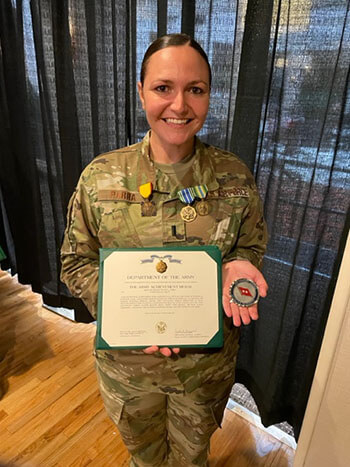 The Department of the Army recognized Air Force 1st Lt. Tiffany Parra for her service supporting a Louisiana ICU during the COVID-19 pandemic. Despite the challenges caring for critical patients brings, she loves her work as an Air Force nurse. (Photo: Courtesy of Air Force 1st Lt. Tiffany Parra)
The Department of the Army recognized Air Force 1st Lt. Tiffany Parra for her service supporting a Louisiana ICU during the COVID-19 pandemic. Despite the challenges caring for critical patients brings, she loves her work as an Air Force nurse. (Photo: Courtesy of Air Force 1st Lt. Tiffany Parra)
Nursing during COVID-19
Parra's background makes her precisely the type of nurse that the Military Health System relies on to support hundreds of thousands of COVID-19 patients throughout the pandemic.
"Unexpectedly, the entire United States needed our help during COVID," she recalls.
From late 2020 to 2022, she deployed on three Federal Emergency Management Agency missions to support the COVID-19 pandemic.
"At the end of 2020, I supported a hospital in North Dakota as a critical care nurse for about two months," said Parra. "From August to November of 2021, I got deployed again to another FEMA COVID mission in a Louisiana intensive care unit."
She had only been home for about three weeks when she got another call. She spent the end of November to January 2022 supporting a third FEMA COVID-19 mission in Minnesota.
"You don't realize how much of an impact you make until you're there," she says. "You're working with all these other nurses that are at their breaking point with COVID…it's so rewarding and challenging at the same time."
Despite the challenges and emotional, physical, and mental toll the responsibility takes, Parra says she's "very, very proud" of those deployments.
"I think the major challenge was dealing with so many families that want to be there with their family member, but can't," she says. Many hospitals restricted visitors for COVID-19 patients, an effort to limit the spread of infection.
"Unfortunately, in the ICU, we see patients who are very advanced with COVID. They're not getting better, so it's sad and definitely a challenge," she says.
Throughout the pandemic, nurses like Parra are not only the patients' care takers but also serve as an intermediary with families.
"It's always challenging to be the person that's there with a family member who's going through the hardest moment of their lives or having to call their family members and let them know things aren't looking good and they should come in," she said.
"That was just a constant with COVID," she said. "It happened over and over."
Learning how to help families cope with COVID-19 was the hardest part.
"It definitely takes a toll," she said. "We all do our best to make sure everybody is taken care of, our patients, the family members," she says. "It's hard and you often forget about yourself, but as a nurse, you have no choice, so you adapt."
To help reduce the stress of her job, Parra took part in group exercises and morale events.
"Having those sessions where everybody talks about their experience is like a counseling session between everybody," she said. "They help everybody open up and speak about their experience and challenges."
For her excellence and "dedication to duty, selfless service, and steadfast leadership," Parra received a coin from the Louisiana Army National Guard Adjutant General, Maj. Gen. Keith Waddell, as well as the Army Achievement Medal for Exceptional Achievement while assigned as a critical care nurse with Medical Response Team Alexandria, Louisiana.
Her entire team received the Armed Forces Services Medal and the Louisiana Emergency Service Medal for "honorable and faithful service in support of" saving the lives of Louisiana citizens during the COVID-19 pandemic.